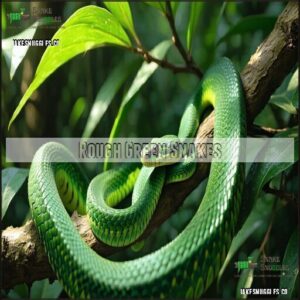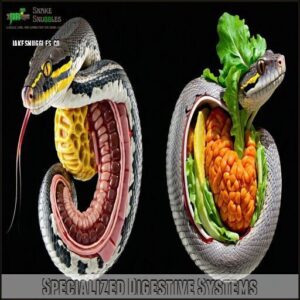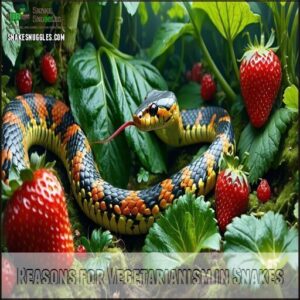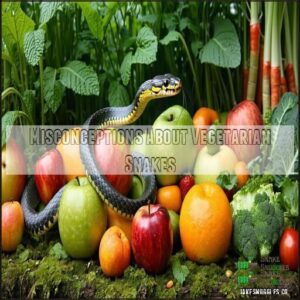This site is supported by our readers. We may earn a commission, at no cost to you, if you purchase through links.

You might think these slithery creatures could sometimes opt for a salad, but they’re actually obligate carnivores, meaning their bodies are built specifically for meat consumption.
All snake species have evolved specialized jaw structures, digestive enzymes, and hunting strategies purely for animal prey.
Their digestive systems can’t process plant matter effectively.
Even those green-colored snakes you might suspect of plant-eating (like the Green Tree Python) are just sporting camouflage to help them hunt more efficiently.
The natural world is full of dietary diversity, but snakes have firmly chosen their lane on the food chain.
Table Of Contents
- Key Takeaways
- Are There Vegetarian Snakes?
- Types of Vegetarian Snakes
- Adaptations for a Plant-Based Diet
- Habitats of Vegetarian Snakes
- Reasons for Vegetarianism in Snakes
- Misconceptions About Vegetarian Snakes
- Frequently Asked Questions (FAQs)
- Are there snakes that don’t eat meat?
- What pet snakes are vegetarian?
- Are there any vegetarian reptiles?
- Are there any herbivore snakes?
- Is there a vegetarian snake?
- Are sweet potatoes vegan?
- Can snakes eat a vegan diet?
- Can a vegan own a pet snake?
- Do vegetarian snakes consume eggs?
- Can snakes eat vegetables?
- Conclusion
Key Takeaways
- All snakes are obligate carnivores – there’s no such thing as a vegetarian snake in nature, despite what you might have heard.
- Snake digestive systems can’t process plant matter – they lack the enzymes needed to break down cellulose and their bodies are specifically adapted for meat consumption.
- Even green-colored snakes like the Rough Green Snake and Smooth Green Snake are strict carnivores – their coloration is for camouflage, not an indication of herbivory.
- While some reptiles (like iguanas and tortoises) can thrive on plant-based diets, all 3,400+ snake species require animal proteins to survive and would become malnourished on vegetarian diets.
Are There Vegetarian Snakes?
Curious about vegetarian snakes? Nature has a simple answer for you: they don’t exist. Every snake species on Earth is what biologists call an obligate carnivore—they absolutely must eat meat to survive.
Snakes rely solely on meat; their bodies aren’t designed to digest plants or absorb nutrients from vegetation.
Snake biology is fascinating precisely because these animals are perfectly adapted for carnivory. Their digestive systems lack the enzymes needed to break down plant cell walls. A plant-based diet would lead to malnutrition and death—creating serious ethical concerns for pet owners considering vegetarian diets for their snakes.
Their simplified digestive tract, specialized teeth, and hunting adaptations all point to one conclusion: snakes are meat-eaters through and through. Some snakes, like the African egg-eating snake, have a diet that consists of consuming bird eggs.
Snakes survive solely on meat; their bodies aren’t designed for plants, making them nature’s ultimate carnivores.
Types of Vegetarian Snakes
Despite what you might expect, you won’t find any truly vegetarian snakes in nature as all 3,400+ snake species are obligate carnivores with digestive systems specifically designed for processing animal proteins.
What you’ll discover instead are specialized feeders like African egg-eating snakes that consume only eggs, or insectivores like garter snakes that primarily eat small animals but may occasionally ingest plant matter by accident.
Rough Green Snakes
Many Rough Green Snakes appear as living emeralds among forest foliage, reaching 20-32 inches in length but rarely exceeding 1 inch in diameter. These slender reptiles aren’t vegetarians but insectivores with a snake diet consisting entirely of small insect prey.
Their bright green coloration provides perfect camouflage among leaves, supporting their arboreal lifestyle as they navigate through branches with ease. Despite their name, they don’t consume any plant matter.
You can find related Rough Green Snake products online.
Four notable characteristics make them fascinating:
- Excellent climbers with specialized rough scales for gripping branches
- Gentle temperament making them docile compared to other species
- Specialized hunting techniques for capturing invertebrates
- Specific captive care requirements including humidity control
Their remarkable adaptations allow them to thrive in leafy environments while maintaining their strictly carnivorous nature.
Smooth Green Snakes
While rough green snakes showcase distinctive textures, their smooth cousins offer equally fascinating traits.
Smooth green snakes are slender reptiles reaching 14-20 inches in length, with males featuring longer tails than females.
Despite what their placement in this article might suggest, smooth green snakes aren’t vegetarian or herbivores.
These reptiles follow a strictly carnivorous diet focusing on:
- Small insects like caterpillars and moths
- Spiders and harvestmen
- Small invertebrates including snails and worms
- Various arthropods found in their grassland habitats
Their bright green coloration provides excellent camouflage among vegetation where they hunt.
You’ll find them primarily in meadows and grasslands across the northern United States.
If you want to buy merchandise, check out the smooth green snake.
Their smooth scales (unlike the keeled scales of rough green snakes) give them their name.
No snakes actually eat plants or consume plant matter – all are obligate carnivores by nature.
Asian Vine Snakes
The slender Asian vine snake (Ahaetulla prasina) isn’t actually vegetarian at all.
You’ll find these beautiful reptiles hunting through the trees of Southeast Asia with their remarkable camouflage techniques.
Despite myths about herbivore snakes, they’re strict carnivores with a diet specifically focused on small lizards, frogs, and other tiny vertebrates.
Their arboreal lifestyle and leaf-green coloration might make them appear plant-like, but don’t be fooled – no snake eats plants by choice.
Their conservation status remains relatively stable across their range.
Adaptations for a Plant-Based Diet
You won’t find any snakes with true adaptations for plant-based diets since all snakes are obligate carnivores with digestive systems specifically designed for processing animal proteins.
Their specialized teeth, short intestinal tracts, and inability to produce certain enzymes make it physically impossible for them to extract sufficient nutrients from plant matter, as they are obligate carnivores.
Specialized Digestive Systems
Despite what you might believe, snakes have digestive systems exclusively designed for meat consumption, not plants.
Your typical snake’s digestive system efficiently processes animal prey through:
- Powerful stomach acid that breaks down bones, fur, and feathers through acidic breakdown
- Short intestinal length compared to herbivores, optimized for protein digestion
- Specialized digestive enzymes that target animal proteins but can’t process plant cellulose
- Rapid nutrient absorption systems that extract maximum value from meat
- Absence of gut bacteria needed to ferment plant matter
Without these plant-processing abilities, snakes can’t extract nutrients from vegetation.
Their bodies simply haven’t evolved the necessary digestive enzymes or intestinal structures to handle cellulose digestion.
This fundamental limitation makes a vegetarian snake physically impossible in nature.
Feeding Behaviors
While snake digestive systems process meat exclusively, their feeding behaviors further confirm why vegetarian snakes don’t exist in nature.
You’ll notice that all snake feeding habits revolve around consuming animal prey, not plants. Their specialized hunting strategies and swallowing mechanisms work together for efficient carnivory.
| Feeding Behavior | Purpose | Example Species |
|---|---|---|
| Ambush predation | Surprise attack | Pythons, vipers |
| Active foraging | Searching for prey | Garter snakes |
| Constriction | Subduing larger prey | Boas, pythons |
| Venom injection | Immobilizing prey | Cobras, mambas |
| Specialized swallowing | Consuming whole prey | All snakes |
Snake diets require animal protein – there’s simply no such thing as a vegetarian snake. Understanding their carnivorous feeding habits is key to understanding their dietary needs.
Habitats of Vegetarian Snakes
The truth about vegetarian snakes is simple – they don’t exist. Despite what you might’ve heard about "herbivore snakes," all snake species are obligate carnivores.
Snakes survive solely on meat; their bodies aren’t designed for plants, making them nature’s ultimate carnivores.
This biological fact shapes where they live. When considering snake habitat, you’ll find these carnivorous reptiles in various ecosystems based on available prey:
- Forest canopy dwellers that hunt birds and tree-dwelling mammals
- Swamp locations with abundant amphibians and fish
- Island endemics with specialized diets based on limited prey
- Burrowing snakes that consume underground insects and rodents
- Urban habitats where adaptable species find rats and mice
No snakes eat plants or vegetables as a primary food source. They require diets of whole prey nutrition to survive.
Reasons for Vegetarianism in Snakes
You’ll find that no snakes are truly vegetarian, as all 3,400+ species worldwide are obligate carnivores with digestive systems specifically adapted for processing animal proteins.
While some snakes like African egg-eaters consume only eggs and others may accidentally ingest plant matter during hunting, their biology simply doesn’t support plant-based nutrition.
Evolutionary Advantages
The surprising truth is that vegetarian snakes don’t exist. All 3,400+ snake species are obligate carnivores with evolutionary adaptations specifically for meat consumption.
Their digestive systems can’t process plant material effectively. Even snakes with specialized diets require animal protein to survive.
| Snake Type | Diet | Adaptive Traits |
|---|---|---|
| Pythons | Mammals/Birds | Heat-sensing pits |
| Garter Snakes | Amphibians/Worms | Fast metabolism |
| Egg-eating Snakes | Bird eggs | Specialized jaws |
| Vine Snakes | Small lizards | Camouflage |
| Rattlesnakes | Rodents | Venom delivery |
Snake dietary adaptability involves prey specialization, not herbivory.
Environmental Factors
While our evolutionary discussion showed why most snakes are meat-eaters, environmental factors actually prove no vegetarian snakes exist in nature.
Snakes are nature’s dedicated meat-eaters—their biology simply won’t allow for plant-based diets.
Research confirms that snakes can’t survive on plants—they’re obligate carnivores requiring animal proteins.
Environmental pressures like habitat loss don’t change this biological reality.
When you examine snake behavior closely:
- Habitat loss increases hunting challenges but doesn’t transform dietary needs
- Climate change affects prey distribution but can’t alter snake digestive systems
- Pollution impacts both snakes and their prey without creating herbivore options
Even under extreme environmental stress, snakes remain carnivores. Unlike some adaptable creatures, their specialized digestive systems simply can’t process plant matter for nutrition.
Misconceptions About Vegetarian Snakes
While we’ve explored evolutionary factors, let’s address common misunderstandings about snake diets. Despite what you might’ve heard, there’s no such thing as vegetarian snakes – all are obligate carnivores. Their bodies require animal tissue for survival, as they’re evolutionary adapted for meat-eating.
Common dietary myths that need debunking:
- Garter snakes don’t eat plants – they hunt amphibians and insects
- Egg-eating snakes consume animal protein, not vegetation
- "Vegan snakes" don’t exist in nature or captivity
- Plant digestion is physically impossible with snake digestive systems
Feeding your snake fruits or vegetables is like filling your gas tank with orange juice – their bodies simply can’t process plant matter.
Frequently Asked Questions (FAQs)
Are there snakes that don’t eat meat?
While plants fill gardens, no snakes fill up on vegetation.
You won’t find any vegetarian snakes in nature—all species are obligate carnivores with digestive systems specifically designed to process animal proteins, not plant matter.
What pet snakes are vegetarian?
No pet snakes are vegetarian.
All snakes are obligate carnivores, meaning they must eat meat to survive.
Even species like egg-eating snakes still consume animal proteins, not plants, for their nutritional needs, which makes them obligate carnivores.
Are there any vegetarian reptiles?
Yes, there are vegetarian reptiles.
Unlike snakes (which are all carnivores), iguanas, tortoises, and many other lizards thrive on plant-based diets.
They’ve evolved digestive systems specifically designed to process fruits, vegetables, and leafy greens.
Are there any herbivore snakes?
Sorry to burst your bubble, but no herbivore snakes exist. All snakes are obligate carnivores with digestive systems that can’t process plant matter. They’ve evolved specifically to eat animal prey.
Is there a vegetarian snake?
No, vegetarian snakes don’t exist in nature.
All snake species are obligate carnivores with digestive systems specifically designed for processing animal proteins.
They can’t survive on plant matter and require meat-based diets to thrive.
Are sweet potatoes vegan?
Sweet potatoes are definitely vegan! They’re plant roots that don’t contain any animal products or byproducts. You’ll find them in many vegan recipes because they’re versatile, nutritious, and naturally delicious.
Can snakes eat a vegan diet?
Despite what you might hope, snakes can’t survive on a vegan diet.
They’re obligate carnivores with digestive systems designed only for animal proteins.
Feeding your snake plants would actually harm them—they need meat to live.
Can a vegan own a pet snake?
Yes, you can absolutely own a snake as a vegan. You’ll need to feed it animal-based foods though, as all snakes are obligate carnivores and can’t survive on plant matter.
Do vegetarian snakes consume eggs?
Vegetarian snakes don’t actually exist – all snakes are carnivores.
Egg-eating snake species like the African egg-eater consume eggs, but they’re still classified as carnivores since eggs are animal protein, not plant matter.
Can snakes eat vegetables?
Like trying to feed steak to a hamster, you can’t feed vegetables to snakes.
They’re obligate carnivores with digestive systems only designed for animal proteins.
Their bodies simply can’t process plant matter for nutrition.
Conclusion
Surprisingly, despite what you might’ve read online, there aren’t vegetarian snakes in nature.
While the idea of plant-munching serpents seems fascinating, all snakes are obligate carnivores with bodies designed exclusively for meat consumption.
Next time someone asks "are there vegetarian snakes," you’ll know the truth—these reptiles simply can’t process plant matter effectively.
Their specialized jaws, digestive systems, and hunting strategies have evolved specifically for animal prey, firmly establishing their carnivorous role in our natural world.














